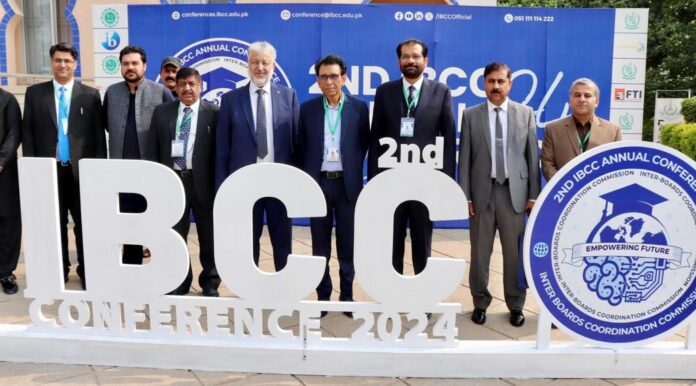ISLAMABAD, Oct 23 (APP):The 2nd IBCC Annual Conference, under the theme “Building a Brighter Future: The Role of Technology in Assessment,” successfully wrapped up its first day at Allama Iqbal Open University, Islamabad.
The conference, which brought together na
tional and interna
tional educa
tional boards, industry leaders, and policymakers, is an important step towards advancing technology-driven assessment solutions in Pakistan. The event began with a welcome address by Dr. Ghulam Ali Mallah, Executive Director of the Inter Boards Coordination Commission (IBCC).
He warmly welcomed participants, highlighting the importance of collaboration between na
tional and interna
tional bodies to promote innovative and standardized assessment systems.
The opening ceremony was graced by Dr. Khalid Maqbool Siddique, Minister for Federal Education and Professional Training, as the Chief Guest. In his keynote, he stressed the role of technology in modernizing Pakistan’s educa
tional landscape, particularly in the assessment sector, to ensure fairness, transparency, and adaptability in the digital age.
Chairman of the Higher Education Commission (HEC), Dr. Mukhtar Ahmed, also graced the event as a guest of honor, highlighting the necessity of utilizing technology for educa
tional reforms.
The first keynote session was delivered by Prof. Dr. Zubair A. Shaikh, President of Muhammad Ali Jinnah University, on the topic “The Future of Educa
tional Assessment in the Digital Era: A
Global Perspective.”
He outlined how educa
tional systems worldwide are adapting to new technologies, urging Pakistani institutions to follow suit in order to remain competitive and progressive.
Prof. Dr. Nasir Mehmood, Vice Chancellor of Allama Iqbal Open University, also delivered an impactful session on “Indigenous Issues in Assessment and the Way Forward.”
He shed light on the unique challenges Pakistan faces in its assessment frameworks and d
iscussed how technology can provide tailored solutions to these issues while respecting local contexts. A high-profile Panel D
iscussion on “Integrating Technology into Examination Systems: Challenges and Solutions” brought together top education leaders and technology experts.
Moderated by Prof. Dr. Shahid Soroya, Director General of the Pakistan Institute of Education (PIE), the panel included Lt. Gen. Moazzam Ejaz, HI (M) (Retd) – Rector, Na
tional University of Technology (NUTECH), Islamabad, Prof. Dr. Arshad Saleem Bhatti, SI. TI. – Rector, Virtual University (VU) of Pakistan, Islamabad, Prof. Dr. Jamil Ahmed – Member IT, Higher Education Commission (HEC) of Pakistan, Islamabad, Dr. Nasir Mahmood – Director, Assessment and Framework, Punjab Examination Commission (PEC), Lahore and Dr. Irfan Muzaffar – CEO, Margallah Thought Collective, Islamabad.
The panel explored solutions to the challenges of implementing technology in examination systems, focusing on infrastructure, data security, and training.
Practical insights were shared to improve assessment practices across Pakistan. Day One also featured two capacity-building workshops: First “Digital Solutions for the Assessment Lifecycle” And secondly “Developing Implementation Plans for Standardized Assessment Frameworks” These workshops provided participants with actionable strate
gies to integrate digital tools into their assessment processes and implement standardized frameworks within their institutions.
The conference saw active participation from na
tional and interna
tional education boards, as well as key partner organizations, including TMUC, Cambridge Interna
tional Education, Oxford AQA, Learning Resource Network, Pearson Pakistan, FTI Consultants, Interna
tional Baccalaureate, Denning Pakistan, and Trinity School, Lahore.
Their involvement highlights the global collaboration and knowledge-sharing essential for shaping a forward-looking educa
tional assessment system in Pakistan. Day 2 will feature more insightful sessions, continuing the momentum from the first day’s d
iscussions.
